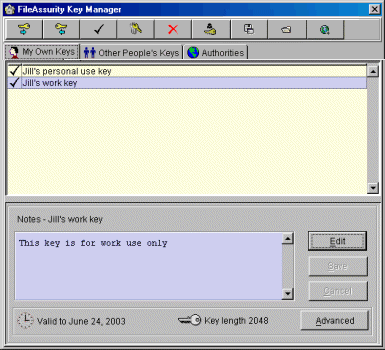Key Manager shows a GUI view of your keystore. It lets you add and delete protection, signing, access and verification keys, and edit their associated notes. Before you can secure files for yourself or other people you must first use Key Manager to create or add your personal keys and other people's keys to FileAssurity.
Selecting 'Key Manager' from the Security menu displays the following tabbed dialog:

Main Tabs
My Keys
This tab lists your personal protection and signing keys. You protect files with your personal protection keys when you want to make sure that only you can access them, or if you need a protected copy of a file sent to someone else. See My Keys for further information.
Recipient Keys
This tab lists other peoples keys that you have imported into Key Manager. Files that you protect using these keys can only be accessed by people that own the keys. See Recipient Keys for further information.
Authorities
This tab contains industry recognized Certification Authorities (CAs) that vouch for the validity of keys used to sign files. See Authorities for more information.
Menu Options
Adds keys to your keystore. These may be your keys or keys provided by other people. See importing keys to Key Manager.
Exports keys from your keystore. You may only export your public protection keys with this facility. See exporting keys from Key Manager.
Validates all the keys in your keystore. See keystore logon & security.
Generates a protection and signing key for you. See generating keys for more information.
Deletes keys from your keystore. Highlight a key and then select this option. A dialog will be displayed asking you to confirm that you wish to delete the key before deletion takes place because this action cannot be reversed. You should always backup your keystore before deleting keys.
Selecting this option enables you to change your keystore password. See keystore logon & security.
Backs up the keys in your keystore. See backing up your keystore for more information.
Restores a previous backup of your keystore. See restoring your keystore for more information.
Updates your Trusted Authorities list. See updating Trusted Authorities for more information.
Closes the Key Manager application.
Main Display Area
The main display area initially displays the default names of the keys in your keystore. The names shown are 'friendly names' that should help you identify the source of the key. You can change names by double-clicking on the appropriate key name, editing it and pressing 'Enter'. You would normally only make changes when the name is not helpful. Remember that once a change is made it is not possible for the system to automatically recover information. A flashing cursor is displayed in the selected field to let you know you are in EDIT mode.
A
Notes
You can enter any information you find useful in this section. This information is purely for your own purposes, to help you identify keys, or to store additional information associated with them. For example, you may want to enter what you use this key for or for storing additional information about the owner of the key (such as their address or phone number). The notes section is not used by FileAssurity for any purpose.
NOTE: If no keys are displayed in the selected tab then the notes section will not be visible. This will be the case for the 'My Keys' and 'Recipient Keys' tabs until you add keys.
Editing Notes
You can edit notes at any time by highlighting the appropriate key and selecting
Saving Notes
Select
Cancelling Changes
Select
 in order to cancel any changes you have made.
in order to cancel any changes you have made.Key Information
Information related to a key is displayed at the bottom of the dialog.
The date on which the key ceases to be valid.
Strength of the key (the number of bits).
Press this button to view additional key information associated with the key you have selected (highlighted).